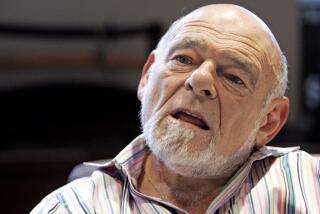Speculators not betting on Tribune buyout
- Share via
As Tribune Co. shareholders prepare to convene in Chicago on Tuesday to vote on an $8.4-billion buyout led by investor Sam Zell, the noise in the background is Wall Street traders chirping that the deal might never get done -- at least as proposed.
Amid one of the most turbulent summers in years for the stock market, Tribune shares have slid steadily and steeply. The stock closed Friday at $25.67, just a few dimes above a multiyear low and 25% below the $34 offering price.
The main reason for the investor skepticism is the heavy debt load that Chicago-based Tribune would be carrying after it went private, plus the continuing decline in advertising revenue and cash flow from the company’s TV stations and newspapers, including the Los Angeles Times.
Both Zell and Tribune management have insisted all along that the deal will close on schedule by year-end and at the announced price.
The big discount in the share value reflects a vote of no confidence by speculators known as risk arbitrageurs, who tend to take over trading in a stock from the time a buyout is announced and when it is completed.
Somebody willing to gamble that the deal will close on time could pocket a hefty return, and a few hedge funds apparently have been willing to take that bet. As of June 30, according to Securities and Exchange Commission records, Stark Offshore Management, Perry Corp. and Renaissance Technologies had bought 7.3 million, 4 million and 1.4 million shares, respectively.
The discount also has led Zell to consider buying some shares on the open market, according to people familiar with his thinking. Such a transaction might serve as a vehicle for Zell to increase his equity investment in Tribune, which might salve some of the banks’ concerns about the deal’s high leverage. But it would be complicated by a federal rule restricting short-term stock purchases by company insiders, including directors like Zell.
Under the so-called short-swing trade rule, any insider who buys and sells shares in his or her company within six months of each other must disgorge to the company any profits made on the trades. The trader might still have to pay taxes on the gain. In certain circumstances the trading can be authorized in advance by the company’s board and a shareholder vote, but it’s unclear whether those waivers would apply in this case.
Also uncertain is how much Tribune stock Zell would be able to buy at the current discount: Any large block trade is likely to move the price up, especially if it is identified with Zell, as that would signal to other investors his determination to complete the purchase as announced.
After Tuesday’s expected vote in favor of the buyout, the main obstacle is approval of the deal by the Federal Communications Commission, which must agree to transfer the licenses of Tribune’s 23 TV stations and one radio station to the new company. It must also issue waivers allowing the company to own both TV stations and newspapers in five cities, including Los Angeles, where Tribune owns KTLA Channel 5 in addition to The Times.
Such cross-ownership violates FCC regulations, but the commission has been considering eliminating that ban.
To Wall Street, the big obstacle isn’t the FCC but the new company’s ability to service a huge debt load on what looks to be a shrinking source of cash flow. Even after a planned sale of Tribune’s Chicago Cubs baseball team, the new company is expected to carry more than $10 billion of debt.
Last week, Lehman Bros. Holdings Inc. analyst Craig Huber questioned whether the buyout would go through. In a note to investors, Huber projected that the company’s earnings before interest, taxes, depreciation and amortization -- a popular measure of cash flow among media companies -- would fall to $990 million in 2008, $50 million below previous estimates.
Huber said the stock could collapse if the deal fizzles.
An executive at a private equity firm that invests in media companies said that in light of the falloff of Tribune advertising revenue since the buyout was announced April 2, he expected Zell to try to renegotiate a lower price. The person declined to be identified because he did not want to alienate people with whom he might do future business.
“It’d take a shareholder vote to change the price, and all hell would break loose,” he said, “but I’m betting all hell breaks loose.”
More bullish observers said that Tribune still had the cash flow to cover its projected debt payments and could raise money by selling such attractive properties as its one-third stake in the Food Network, which some analysts have estimated is worth $1 billion.
Step one of the two-step buyout came in May when Tribune bought back slightly more than half of its shares. The remaining shares are to be bought back in the fourth quarter. Tribune Chief Executive Dennis J. FitzSimons has said that the commitments are solid from four major banks to provide the $4.2 billion in loans for the second stage.
michael.hiltzik@latimes.com
More to Read
The biggest entertainment stories
Get our big stories about Hollywood, film, television, music, arts, culture and more right in your inbox as soon as they publish.
You may occasionally receive promotional content from the Los Angeles Times.










